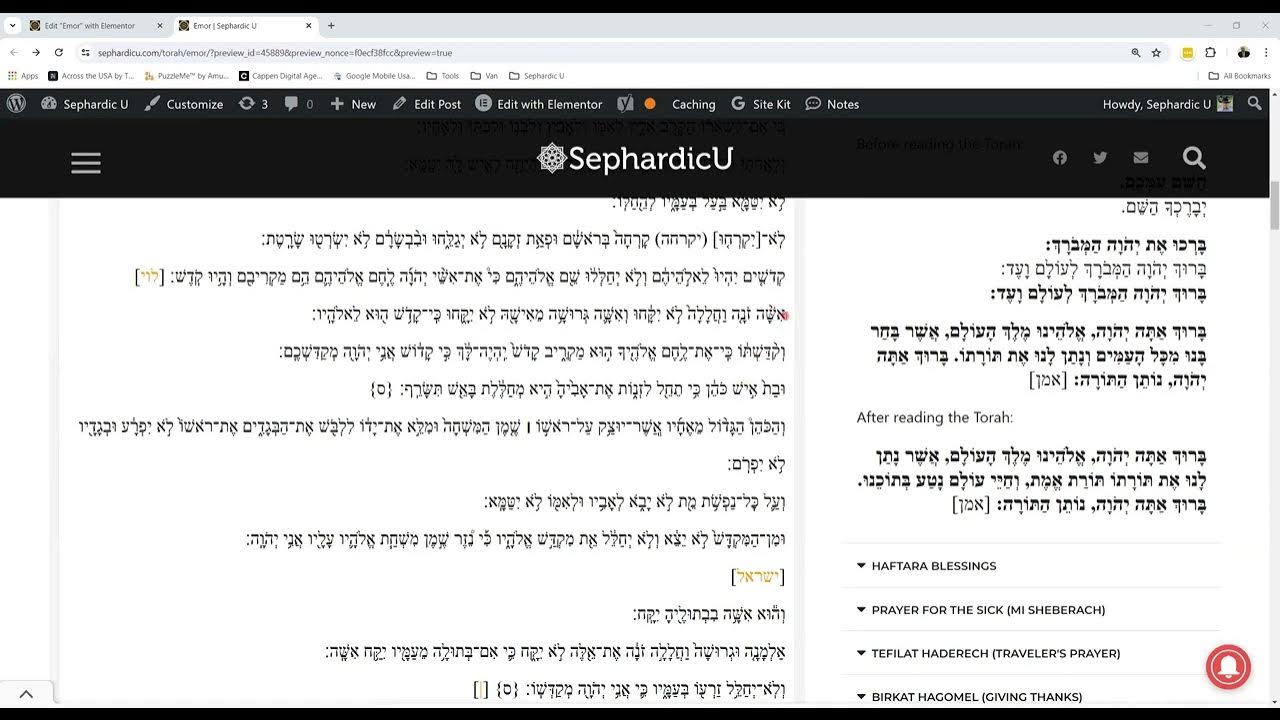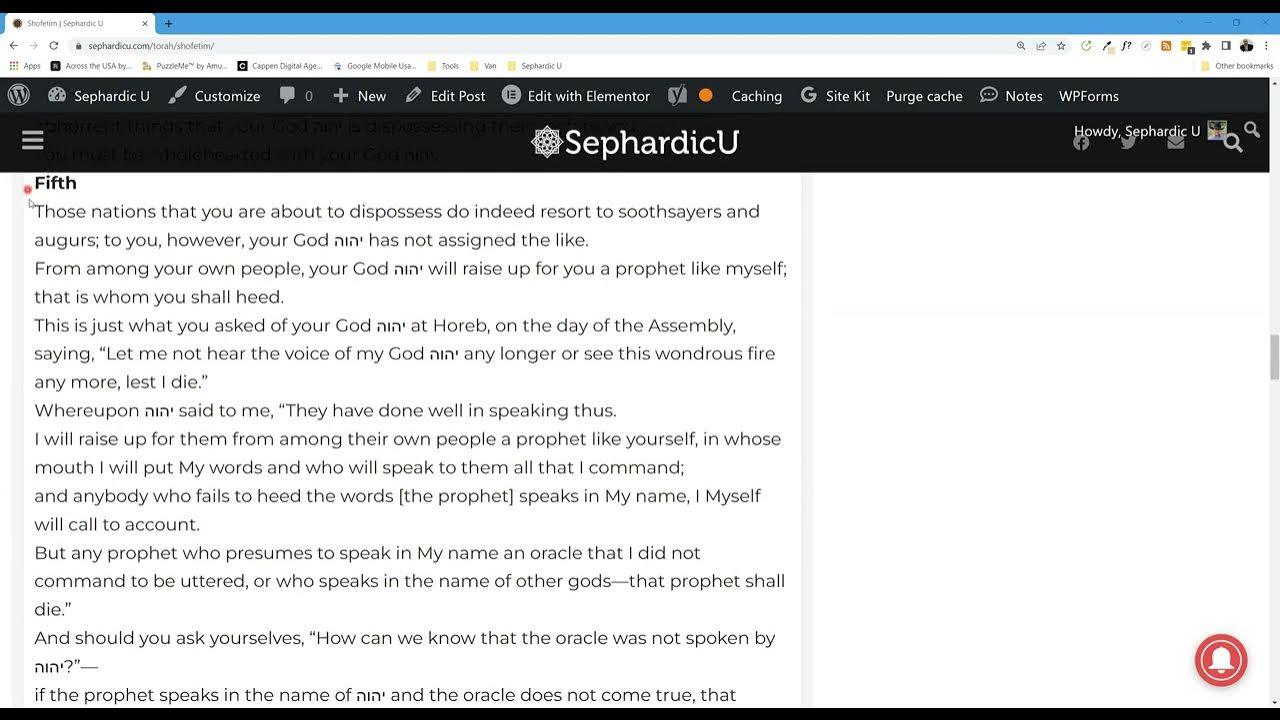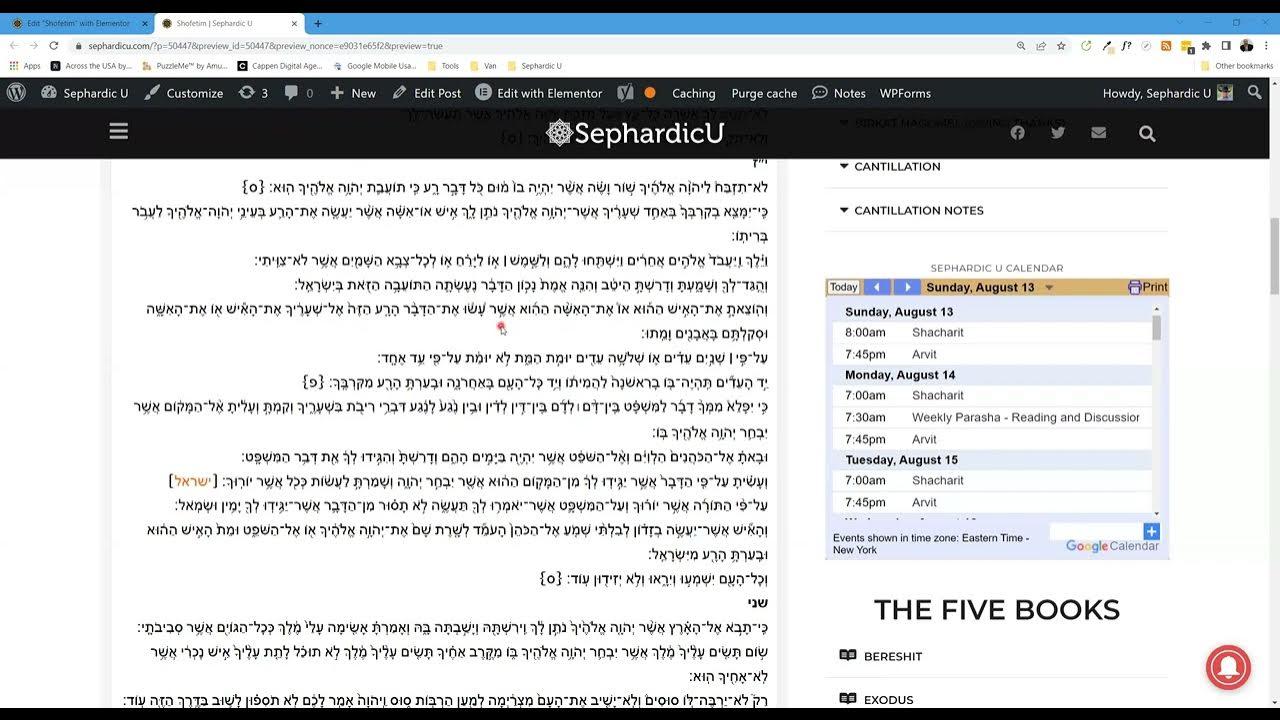Parashat Shoftim (פָּרָשַׁת שׁוֹפְטִים) is a Torah portion in the Book of Deuteronomy (Devarim) that is read in the Jewish tradition on the sixth Shabbat after Tisha B’Av. It encompasses chapters 16:18–21:9 of the Book of Deuteronomy and deals with a variety of laws, regulations, and ethical principles meant to govern the Israelite society as they prepare to enter the Promised Land.
The central theme of Parashat Shoftim revolves around the concept of justice and establishing a fair legal system. Moses addresses the appointment of judges and officials, instructing the Israelites to appoint righteous and impartial judges who will administer justice without favoritism or corruption. The goal is to ensure that justice is accessible to all members of society, regardless of their status or background.
The parashah outlines various laws and principles to maintain a just and ethical society:
The Appointment of Judges: The Israelites are commanded to establish courts in their cities and appoint judges who will judge cases with integrity and fairness. These judges are expected to render decisions based on the Torah’s laws and principles.
Prohibition of Idolatry: The parashah warns against engaging in idolatry, which was a common temptation in the cultures surrounding the Israelites. This serves as a reminder to remain faithful to their covenant with God.
Rules for Kingship: If the Israelites desire to establish a king, there are specific rules and limitations outlined to prevent the king from accumulating too much power or becoming corrupt. The king is instructed to maintain a personal Torah scroll and rule justly.
The Role of Priests and Levites: The priests and Levites are granted specific responsibilities within the religious and legal framework of Israel. They are not allotted a territorial inheritance, but are instead supported by the offerings of the people.
Cities of Refuge: Six cities of refuge are designated as safe havens for individuals who unintentionally cause the death of another person. These cities provide protection against avengers seeking vengeance, ensuring a fair trial for the accused.
Testimony and Evidence: The Torah places great emphasis on the necessity of honest and reliable witnesses in legal cases. False witnesses are sternly condemned, as they undermine the integrity of the legal system.
Warfare and Conduct: Laws regarding warfare are provided, including the requirement to offer terms of peace before attacking a city. There are also ethical guidelines for how to treat captives and the environment during times of conflict.
Unsolved Crimes: In the event that a murder victim is found and the perpetrator is unknown, a ritual involving the elders and judges is prescribed to atone for the crime and to demonstrate the community’s responsibility.
Warnings against Sorcery and Witchcraft: The Torah explicitly forbids practices related to sorcery, divination, and witchcraft.
The Regulation of Trees during Siege: When besieging a city, the Israelites are instructed not to destroy fruit-bearing trees unnecessarily, showing consideration for the environment and the future.
Overall, Parashat Shoftim emphasizes the importance of establishing a just society governed by ethical principles and fair laws. It underscores the necessity of integrity in leadership, the careful administration of justice, and the observance of ethical behavior in all aspects of life. The lessons from this Torah portion continue to resonate in discussions of justice, governance, and ethical conduct in both Jewish tradition and broader societal contexts.
שופטים
דברים ט״ז:י״ח-כ״א:ט׳
Shofetim
Deuteronomy 16:18-21:9
ישעיהו
נ״א:י״ב-נ״ב:י״ב
וַתִּשְׁכַּ֞ח יְהֹוָ֣ה עֹשֶׂ֗ךָ נוֹטֶ֣ה שָׁמַ֘יִם֮ וְיֹסֵ֣ד אָ֒רֶץ֒ וַתְּפַחֵ֨ד תָּמִ֜יד כׇּל־הַיּ֗וֹם מִפְּנֵי֙ חֲמַ֣ת הַמֵּצִ֔יק כַּאֲשֶׁ֥ר כּוֹנֵ֖ן לְהַשְׁחִ֑ית וְאַיֵּ֖ה חֲמַ֥ת הַמֵּצִֽיק׃
מִהַ֥ר צֹעֶ֖ה לְהִפָּתֵ֑חַ וְלֹא־יָמ֣וּת לַשַּׁ֔חַת וְלֹ֥א יֶחְסַ֖ר לַחְמֽוֹ׃
וְאָנֹכִי֙ יְהֹוָ֣ה אֱלֹהֶ֔יךָ רֹגַ֣ע הַיָּ֔ם וַיֶּהֱמ֖וּ גַּלָּ֑יו יְהֹוָ֥ה צְבָא֖וֹת שְׁמֽוֹ׃
וָאָשִׂ֤ם דְּבָרַי֙ בְּפִ֔יךָ וּבְצֵ֥ל יָדִ֖י כִּסִּיתִ֑יךָ לִנְטֹ֤עַ שָׁמַ֙יִם֙ וְלִיסֹ֣ד אָ֔רֶץ וְלֵאמֹ֥ר לְצִיּ֖וֹן עַמִּי־אָֽתָּה׃ {ס}
הִתְעוֹרְרִ֣י הִֽתְעוֹרְרִ֗י ק֚וּמִי יְר֣וּשָׁלַ֔͏ִם אֲשֶׁ֥ר שָׁתִ֛ית מִיַּ֥ד יְהֹוָ֖ה אֶת־כּ֣וֹס חֲמָת֑וֹ אֶת־קֻבַּ֜עַת כּ֧וֹס הַתַּרְעֵלָ֛ה שָׁתִ֖ית מָצִֽית׃
אֵין־מְנַהֵ֣ל לָ֔הּ מִכׇּל־בָּנִ֖ים יָלָ֑דָה וְאֵ֤ין מַחֲזִיק֙ בְּיָדָ֔הּ מִכׇּל־בָּנִ֖ים גִּדֵּֽלָה׃
שְׁתַּ֤יִם הֵ֙נָּה֙ קֹרְאֹתַ֔יִךְ מִ֖י יָנ֣וּד לָ֑ךְ הַשֹּׁ֧ד וְהַשֶּׁ֛בֶר וְהָרָעָ֥ב וְהַחֶ֖רֶב מִ֥י אֲנַחֲמֵֽךְ׃
בָּנַ֜יִךְ עֻלְּפ֥וּ שָׁכְב֛וּ בְּרֹ֥אשׁ כׇּל־חוּצ֖וֹת כְּת֣וֹא מִכְמָ֑ר הַֽמְלֵאִ֥ים חֲמַת־יְהֹוָ֖ה גַּעֲרַ֥ת אֱלֹהָֽיִךְ׃
לָכֵ֛ן שִׁמְעִי־נָ֥א זֹ֖את עֲנִיָּ֑ה וּשְׁכֻרַ֖ת וְלֹ֥א מִיָּֽיִן׃ {פ}
כֹּה־אָמַ֞ר אֲדֹנַ֣יִךְ יְהֹוָ֗ה וֵאלֹהַ֙יִךְ֙ יָרִ֣יב עַמּ֔וֹ הִנֵּ֥ה לָקַ֛חְתִּי מִיָּדֵ֖ךְ אֶת־כּ֣וֹס הַתַּרְעֵלָ֑ה אֶת־קֻבַּ֙עַת֙ כּ֣וֹס חֲמָתִ֔י לֹא־תוֹסִ֥יפִי לִשְׁתּוֹתָ֖הּ עֽוֹד׃
וְשַׂמְתִּ֙יהָ֙ בְּיַד־מוֹגַ֔יִךְ אֲשֶׁר־אָמְר֥וּ לְנַפְשֵׁ֖ךְ שְׁחִ֣י וְנַעֲבֹ֑רָה וַתָּשִׂ֤ימִי כָאָ֙רֶץ֙ גֵּוֵ֔ךְ וְכַח֖וּץ לַעֹבְרִֽים׃ {פ}
נ״ב
עוּרִ֥י עוּרִ֛י לִבְשִׁ֥י עֻזֵּ֖ךְ צִיּ֑וֹן לִבְשִׁ֣י ׀ בִּגְדֵ֣י תִפְאַרְתֵּ֗ךְ יְרֽוּשָׁלַ֙͏ִם֙ עִ֣יר הַקֹּ֔דֶשׁ כִּ֣י לֹ֥א יוֹסִ֛יף יָבֹא־בָ֥ךְ ע֖וֹד עָרֵ֥ל וְטָמֵֽא׃
הִתְנַעֲרִ֧י מֵעָפָ֛ר ק֥וּמִי שְּׁבִ֖י יְרוּשָׁלָ֑͏ִם (התפתחו) [הִֽתְפַּתְּחִי֙] מוֹסְרֵ֣י צַוָּארֵ֔ךְ שְׁבִיָּ֖ה בַּת־צִיּֽוֹן׃ {ס}
כִּי־כֹה֙ אָמַ֣ר יְהֹוָ֔ה חִנָּ֖ם נִמְכַּרְתֶּ֑ם וְלֹ֥א בְכֶ֖סֶף תִּגָּאֵֽלוּ׃ {ס}
כִּ֣י כֹ֤ה אָמַר֙ אֲדֹנָ֣י יֱהֹוִ֔ה מִצְרַ֛יִם יָֽרַד־עַמִּ֥י בָרִֽאשֹׁנָ֖ה לָג֣וּר שָׁ֑ם וְאַשּׁ֖וּר בְּאֶ֥פֶס עֲשָׁקֽוֹ׃
וְעַתָּ֤ה מַה־לִּי־פֹה֙ נְאֻם־יְהֹוָ֔ה כִּֽי־לֻקַּ֥ח עַמִּ֖י חִנָּ֑ם מֹשְׁלָ֤ו יְהֵילִ֙ילוּ֙ נְאֻם־יְהֹוָ֔ה וְתָמִ֥יד כׇּל־הַיּ֖וֹם שְׁמִ֥י מִנֹּאָֽץ׃
לָכֵ֛ן יֵדַ֥ע עַמִּ֖י שְׁמִ֑י לָכֵן֙ בַּיּ֣וֹם הַה֔וּא כִּֽי־אֲנִי־ה֥וּא הַֽמְדַבֵּ֖ר הִנֵּֽנִי׃ {ס}
מַה־נָּאו֨וּ עַל־הֶהָרִ֜ים רַגְלֵ֣י מְבַשֵּׂ֗ר מַשְׁמִ֧יעַ שָׁל֛וֹם מְבַשֵּׂ֥ר ט֖וֹב מַשְׁמִ֣יעַ יְשׁוּעָ֑ה אֹמֵ֥ר לְצִיּ֖וֹן מָלַ֥ךְ אֱלֹהָֽיִךְ׃
ק֥וֹל צֹפַ֛יִךְ נָ֥שְׂאוּ ק֖וֹל יַחְדָּ֣ו יְרַנֵּ֑נוּ כִּ֣י עַ֤יִן בְּעַ֙יִן֙ יִרְא֔וּ בְּשׁ֥וּב יְהֹוָ֖ה צִיּֽוֹן׃
פִּצְח֤וּ רַנְּנוּ֙ יַחְדָּ֔ו חׇרְב֖וֹת יְרוּשָׁלָ֑͏ִם כִּֽי־נִחַ֤ם יְהֹוָה֙ עַמּ֔וֹ גָּאַ֖ל יְרוּשָׁלָֽ͏ִם׃
חָשַׂ֤ף יְהֹוָה֙ אֶת־זְר֣וֹעַ קׇדְשׁ֔וֹ לְעֵינֵ֖י כׇּל־הַגּוֹיִ֑ם וְרָאוּ֙ כׇּל־אַפְסֵי־אָ֔רֶץ אֵ֖ת יְשׁוּעַ֥ת אֱלֹהֵֽינוּ׃ {ס}
ס֤וּרוּ ס֙וּרוּ֙ צְא֣וּ מִשָּׁ֔ם טָמֵ֖א אַל־תִּגָּ֑עוּ צְא֣וּ מִתּוֹכָ֔הּ הִבָּ֕רוּ נֹשְׂאֵ֖י כְּלֵ֥י יְהֹוָֽה׃
כִּ֣י לֹ֤א בְחִפָּזוֹן֙ תֵּצֵ֔אוּ וּבִמְנוּסָ֖ה לֹ֣א תֵלֵכ֑וּן כִּֽי־הֹלֵ֤ךְ לִפְנֵיכֶם֙ יְהֹוָ֔ה וּמְאַסִּפְכֶ֖ם אֱלֹהֵ֥י יִשְׂרָאֵֽל׃ {ס}
Isaiah
51:12-52:12
I, I am the One who comforts you!
What ails you that you fear
Man who must die,
Mortals who fare like grass?
You have forgotten GOD your Maker,
Who stretched out the skies and made firm the earth!
And you live all day in constant dread
Because of the rage of an oppressor
Who is aiming to cut [you] down.
Yet of what account is the rage of an oppressor?
Quickly the crouching one is freed;
He is not cut down and slain,
And he shall not want for food.
For I the ETERNAL your God—
Who stirs up the sea into roaring waves,
Whose name is GOD of Hosts—
Have put My words in your mouth
And sheltered you with My hand;
I, who planted the skies and made firm the earth,
Have said to Zion: You are My people!
Rouse, rouse yourself!
Arise, O Jerusalem,
You who from GOD’s hand
Have drunk God’s wrath-filled cup,
You who have drained to the dregs
The bowl, the cup of reeling!
She has none to guide her
Of all the children she bore;
None takes her by the hand,
Of all the children she reared.
These two things have befallen you:
Wrack and ruin—who can console you?
Famine and sword—how shall I comfort you?
Your sons lie in a swoon
At the corner of every street—
Like an antelope caught in a net—
Drunk with the wrath of GOD,
With the rebuke of your God.
Therefore,
Listen to this, unhappy one,
Who are drunk, but not with wine!
Thus said GOD, your Sovereign,
Your God who champions this people:
Herewith I take from your hand
The cup of reeling,
The bowl, the cup of My wrath;
You shall never drink it again.
I will put it in the hands of your tormentors,
Who have commanded you,
“Get down, that we may walk over you”—
So that you made your back like the ground,
Like a street for passersby.
52
Awake, awake, O Zion!
Clothe yourself in splendor;
Put on your robes of majesty,
Jerusalem, holy city!
For the uncircumcised and the impure
Shall never enter you again.
Arise, shake off the dust,
Sit [on your throne], Jerusalem!
Loose the bonds from your neck,
O captive one, Fair Zion!
For thus said GOD:
You were sold for no price,
And shall be redeemed without money.
For thus said my Sovereign GOD:
Of old, My people went down
To Egypt to sojourn there;
But Assyria has robbed them,
Giving nothing in return.
What therefore do I gain here?
—declares GOD —
For My people has been carried off for nothing,
Their mockers howl
—declares GOD —
And constantly, unceasingly,
My name is reviled.
Assuredly, My people shall learn My name,
Assuredly [they shall learn] on that day
That I, the One who promised,
Am now at hand.
How welcome on the mountain
Are the footsteps of the herald
Announcing happiness,
Heralding good fortune,
Announcing victory,
Telling Zion, “Your God reigns!”
Hark!
Your lookouts raise their voices,
As one they shout for joy;
For every eye shall behold
GOD ’s return to Zion.
Raise a shout together,
O ruins of Jerusalem!
For GOD will comfort this people,
Will redeem Jerusalem.
GOD will bare a holy arm
In the sight of all the nations,
And the very ends of earth shall see
The victory of our God.
Turn, turn away, touch naught impure
As you depart from there;
Keep pure, as you go forth from there,
You who bear the vessels of GOD !
For you will not depart in haste,
Nor will you leave in flight;
For GOD is marching before you,
The God of Israel is your rear guard.
Shofetim
more on Parashat Shofetim
Quick Guide: The Five Books of Moses
| Genesis | Exodus | Leviticus | Numbers | Deuteronomy |
|---|---|---|---|---|
| Bereshit (1:1-6:8) |
Shemot (1:1-6:1) |
Vayikra (1:1-5:26) |
Bemidbar (1:1-4:20) |
Devarim (1:1-3:22) |
| Noach (6:9-11:32) |
Va'era (6:2-9:35) |
Tzav (6:1-8:36) |
Naso (4:21-7:89) |
Va'etchanan (3:23-7:11) |
| Lech Lecha (12:1-17:27) |
Bo (10:1-13:16) |
Shemini (9:1-11:47) |
Behaalotecha (8:1-12:16) |
Ekev (7:12-11:25) |
| Vayera (18:1-22:24) |
Beshalach (13:17-17:16) |
Tazria (12:1-13:59) |
Shelach (13:1-15:41) |
Re'eh (11:26-16:17) |
| Chaye Sarah (23:1-25:18) |
Yitro (18:1-20:23) |
Metzora (14:1-15:33) |
Korach (16:1-18:32) |
Shoftim (16:18-21:9) |
| Toledot (25:19-28:9) |
Mishpatim (21:1-24:18) |
Achare Mot (16:1-18:30) |
Chukat (19:1-22:1) |
Ki Tetze (21:10-25:19) |
| Vayetze (28:10-32:3) |
Teruma (25:1-27:19) |
Kedoshim (19:1-20:27) |
Balak (22:2-25:9) |
Ki Tavo (26:1-29:8) |
| Vayishlach (32:4-36:43) |
Tetzave (27:20-30:10) |
Emor (21:1-24:23) |
Pinchas (25:10-30:1) |
Nitzavim (29:9-30:20) |
| Vayeshev (37:1-40:23) |
Ki Tisa (30:11-34:35) |
Behar (25:1-26:2) |
Matot (30:2-32:42) |
Vayelech (31:1-30) |
| Miketz (41:1-44:17) | Vayakhel (35:1-38:20) |
Bechukotai (26:3-27:34) |
Masei (33:1-36:13) |
Haazinu (32:1-52) |
| Vayigash (44:18-47:27) |
Pekude (38:21-40:38) |
V'Zot HaBeracha (33:1-34:12) |
||
| Vayechi (47:28-50:26) |











Parashat Behar – Weekday Torah Reading (Moroccan TeAmim)